The Only 7 Things to Do in Zaragoza (Sorry, not sorry)

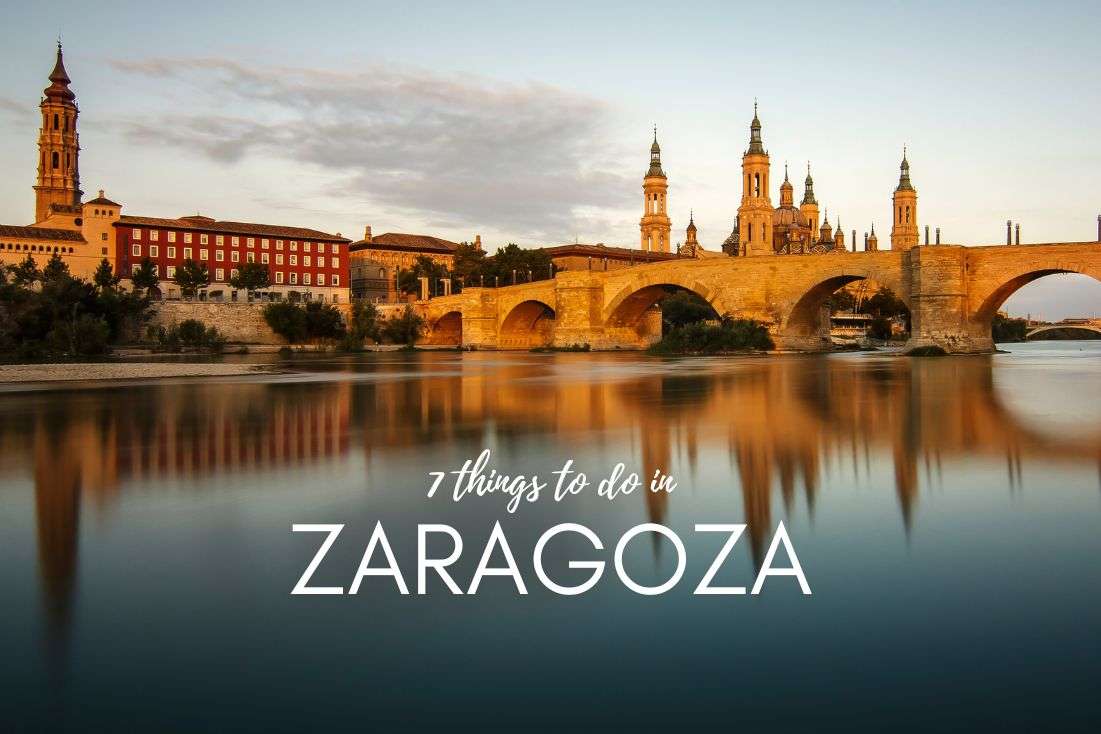
Sitting smack in the middle of the square of popular cities in northern Spain—Madrid, Barcelona, Bilbao and Valencia—sits Zaragoza, the capitol of the Aragon region. Show of hands—who’s heard of Zaragoza before? Like really heard of it, not just stumbled upon it five minutes ago?
Sorry to be the bubble burster to your hidden gem dream, but I’ve concluded that it’s not on the beaten path for a reason. It’s a mundane, largish city that you’ll forget by the time you put your seatbelts on, ready to drive away.
There are three reasons that would move my recommendation on whether to visit or not to a yes:
- You are driving between two of the more popular cities in the north and Zaragoza happens to be in the middle.
- You long to see some Moorish architecture and can’t go to Andalusia.
- You want to party and it's October.
Worst case scenario is choosing Valencia and Zaragoza as the main spots you visit during your trip to Spain. What is this, an attempt at the most boring itinerary ever?! Just kidding. But not really.
Tip: If you’re staying overnight for whatever reason, consider INNSIDE by Melia Zaragoza. It’s located in the Old Town.
Another thing Zaragoza has going against it is the mighty wind, cierzo. If wind comes in from the Atlantic through the Ebro valley, you will want to hide in the palace and not come out. It mostly comes in the fall and winter, but is known to makes its way to Zaragoza at any time of the year.
You might also be interested in reading:
- Andalusia Itinerary: Southern Spain in 10 Days
- Barcelona Itinerary: 5 days in Gaudí’s Metropole (with day trips)
- All You Need to Know about Spanish Tapas (+Restaurant Tips)
- The 10 Best Museums in Spain’s Top Cities
- The 16 Most Beautiful Beaches in Spain
Reason to visit Zaragoza #1: Convenience
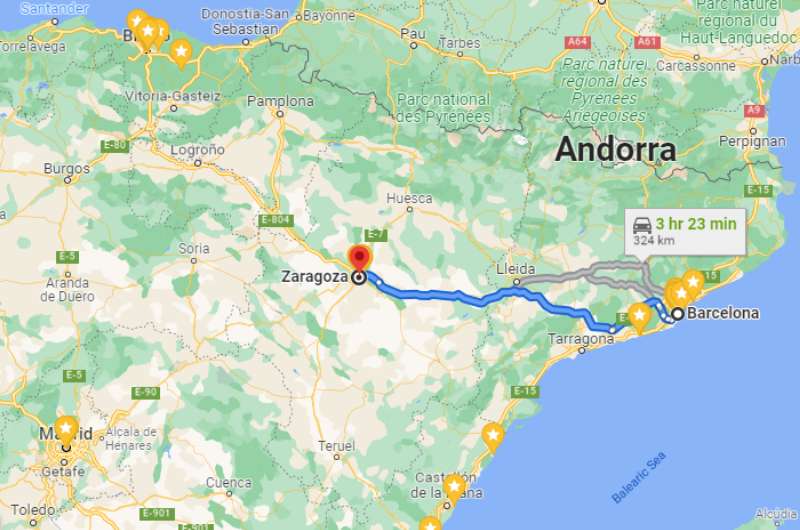
See? Smack in the middle
If you’ve spent a minute researching Zaragoza already, you will see the top reason to visit it is its convenient location. And also the palace and basilica. But really, it’s all about its position.
That said, beware that it isn’t all that close to any of the big cities up north. You’re always looking at a 3-hour drive one way, so you’ll probably staying the night. Unless you’re driving through Zaragoza, you can’t just pop in for a couple of hours and drive back. Nobody likes driving that much.
You might, as did I, think it would be great to add a new destination to your plans, since you’ve already been to Barcelona and Madrid. Let’s drive to Bilbao, we decided, and use Zaragoza as a break in the middle. Boy am I glad Bilbao was worth it!
Reason to visit Zaragoza #2: The Moors
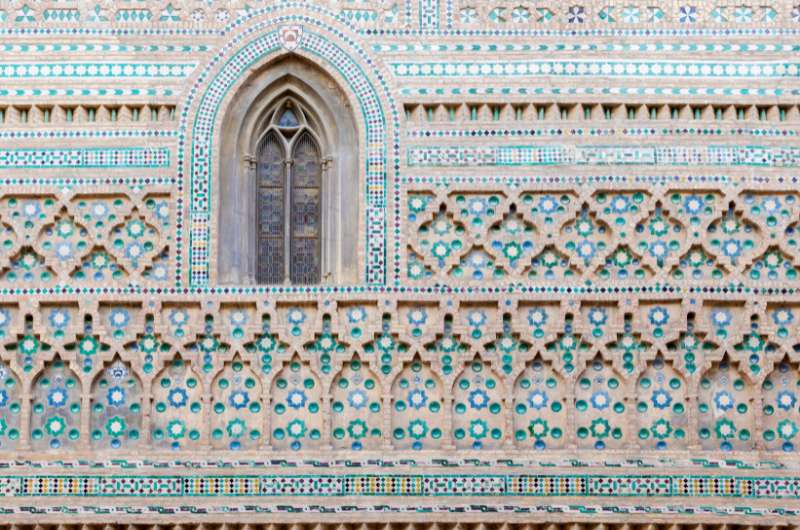
Moorish-style decorations on La Seo Cathedral in Zaragoza
We spent weeks in Andalusia in southern Spain and loved it. The Moorish architecture and lovely people were exceptional. If you fantasize about intricately decorated palaces that make you feel like a sultan, Andalusia is the way to go. The tiles will end up in your dreams, I promise. There are that many of them.
In the north of Spain, there aren’t may remnants of the Moorish era, considering the Christians retreated north and hung out there while the Moors concentrated more in the south.
Zaragoza is special in that the Aljafería Palace is the only remaining example of a large building of Islamic architecture from the Taifa period. Along with the Mosque-Cathedral of Cordoba and the Alhambra in Granada, it is one of the three most important Moorish sites in the country.
Still, I can’t say it blew me away as much as the ones in Andalusia. Sevilla’s Alcazar was way more impressive for instance.
But if Zaragoza is all you can get your hands on and you want to indulge in some Moorish architecture, go.
Reason to visit Zaragoza #3: The Pilar Festival
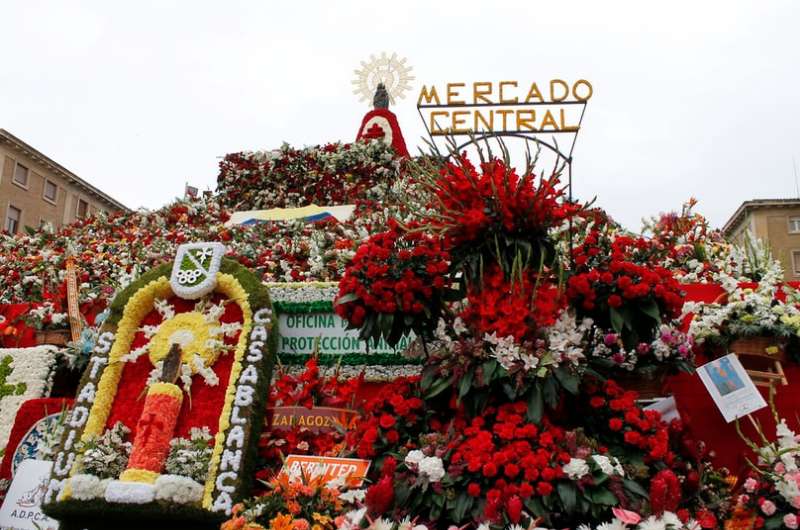
Fiestas del Pilar takes place in October and results in this huge flower pyramid
Similar to the Las Fallas festival in Valencia, there is a festival in Zaragoza that makes it worth considering as a destination. For one week in October, the Pilar Festival takes over the city with massive parades, markets, traditional clothes, and whatnot. Bullfights too, so read up on those in case you are even considering visiting one.
What to do in Zaragoza?
Now that you have decided that you have a good enough reason to go to Zaragoza, here’s what you can do there to pass the time. I mean to enjoy your stay.
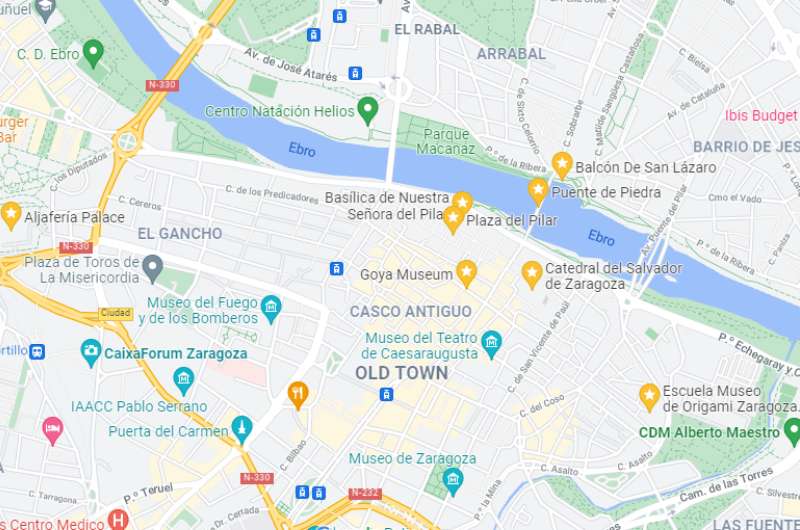
Here is a map of all of the highlights of Zaragoza
1. Fiestas del Pilar
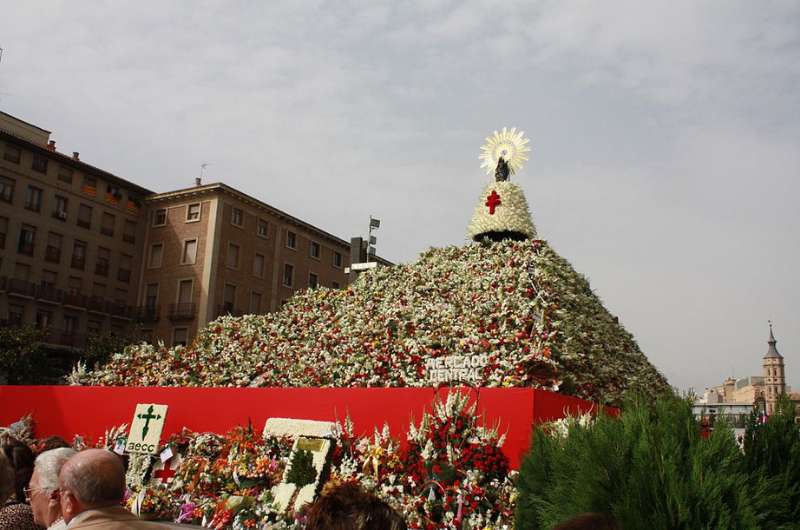
The mountain of flowers after the offering
We have to start with the fun part (too bad it's only fun for a week each year). The big Fiestas de Pilar is a festival celebrated in Zaragoza every year around October 12th. These week-long celebrations are held in honor of the Virgen del Pilar (the one who ordered St. James to build her a temple).
The Fiestas begin on Saturday before the 12th and end the next Sunday. There are events throughout the city, with parades, competitions and concerts held all over the place.
This is a very busy week during which the population of Zaragoza triples, so if you do plan on attending, book your hotel ahead of time.
As is the norm in Spain, this is a large, religious occasion. But since this is Spain, it is far from solemn, and the festivities are fun, loud and colorful.
The highlight of the festival is the Flower Offering, which is to show the people’s devotion to Virgen Mary. An all-day parade takes place, with the ultimate goal of laying flowers at the Virgen statue on the Plaza de Pilar.
Thousands of participants dressed in traditional clothing walk in the parade holding flowers. They then lay the flowers at the Virgen statue in the middle of the Plaza de Pilar, where volunteers pile them into a huge pyramid. By the end of the day, it is quite the mountain!
Tip: For another flower offering festival, check out the Las Fallas of Valencia. Not only is this festival full of firecrackers and fireworks, the week-long festivities end up in flames!!
2. Aljafería Palace
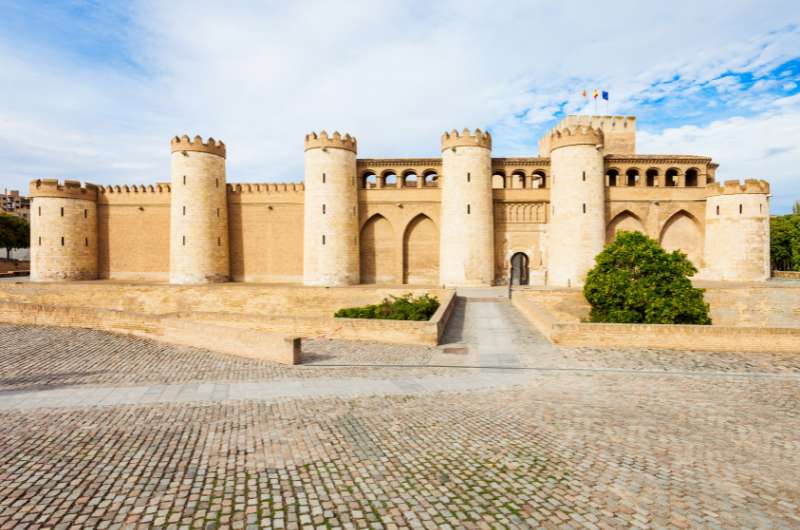
Aljaferia Palace: Intimidating in a cute way
The Black Muslims of Northwest African and the Iberian Peninsula (called the Moors) conquered Zaragoza in 714 and ruled for almost 400 years. They left a great mark on the city in the shape of a castle—the Aljafería Palace.
It is considered one of the most important Islamic monuments in Spain. It was the recreational residence of the Muslim kings and reflects the splendor reached by the Taifa kingdom at its political and cultural peak.
What’s funny about this palace is how perfect the exterior is, it looks like a fairytale castle or a movie set. You almost expect a princess to throw down her hair from one of the round towers.
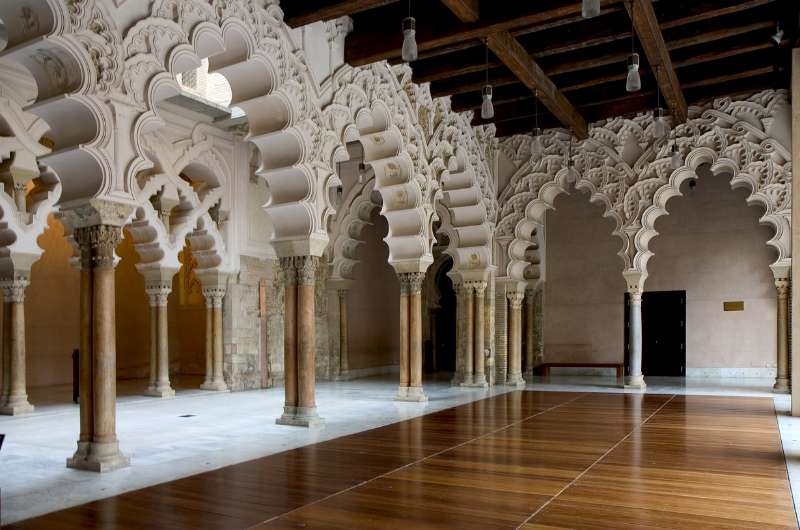
The Aljaferia interiors
The location is a little odd. The palace sits in a park surrounded by a very boring residential neighborhood with a lot of traffic, about a 15-minute walk from the Old Town. The unsightly apartment blocks surrounding the palace are almost offensive to the palace’s significance.
The current parliament of Aragon has its seat at the palace, and you have to make an online reservation prior to your visit. You get a time slot, and that is the time at which the not very friendly guards will let you in. Have your ID on you.
At several specified times during the day, the visit is guided. All other times it is just you and a bunch of other tourists shuffling around, which is what we did. I’d recommend reading up on the history beforehand. There is little to read and almost all of it is in Spanish.
This being a government office building, the areas you can visit are limited. Many of the hallways feel way too modern. The historical rooms aren’t furnished, and you'll spend most of your time looking up at the ceilings. Take some time in the courtyards and you are out of there in an hour.
- Aljafería Palace, Calle de los Diputados, s/n
- Open daily except for Sunday 10 am – 2 pm, 4 pm – 6:30 pm.
- Tickets cost €5. Free entry on the first Sunday and Monday of every month (read “crowds”)
3. Basílica de Pilar
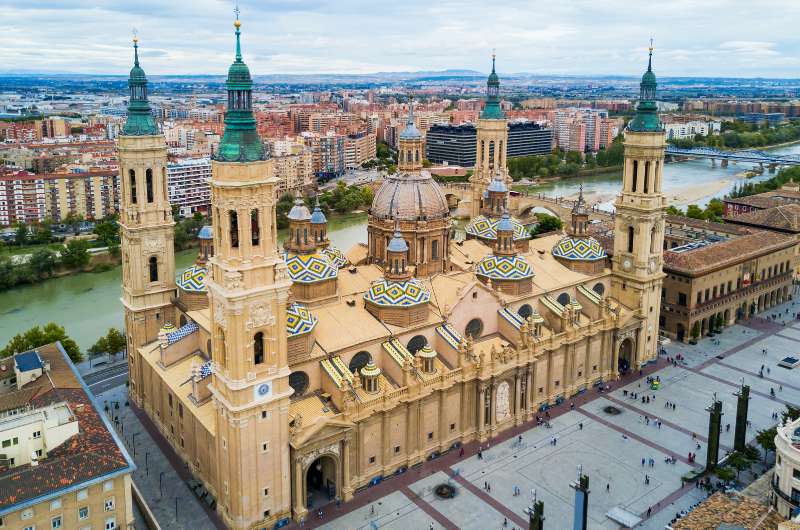
Basilica de Pilar
If you love sacral architecture, you should head straight to the most important religious building in Zaragoza. The Basilica del Pilar is reportedly the first church dedicated to Mary in history.
According to legend, it was built by St. James, who spread Christianity in Spain after the resurrection of Jesus, but was not particularly successful. While praying, the Virgin Mary appeared to him and instructed him to build her a temple and place a pillar and her statue (column=pilar, hence the Basilica de Pilar) on the altar—and so he did.
Tip: The Catalonia El Pilar is a very good hotel right by the basilica.
Uniquely, Mary supposedly appeared to St. James while her actual human person was still living on Earth, making her appearance in Zaragoza an instance of bilocation. While real Mary was busy being Mother of God somewhere in Bethlehem, magical Mary was brought to Zaragoza by angels, who were also responsible for carving the Mary statue and jasper column during their flight there. Busy little bees!
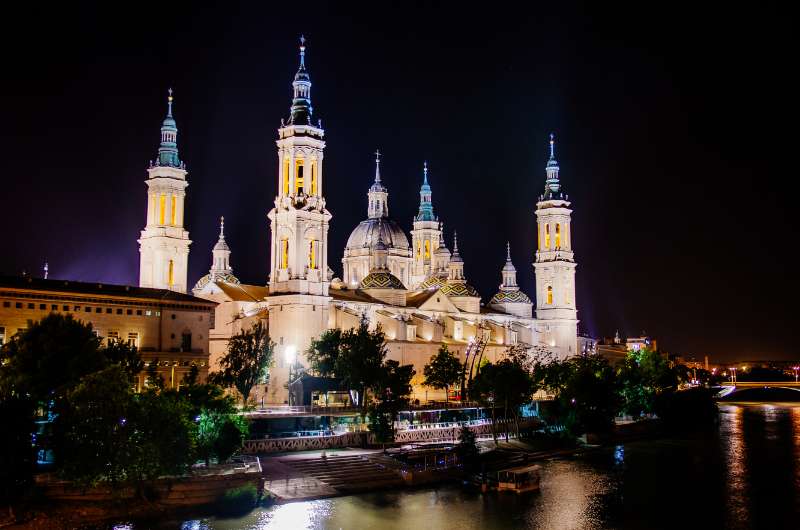
Not too shabby: Basilica de Pilar at night
The 40 cm (15 inch) wooden Mary statue is now standing on a jasper pillar in a bronze and silver case in the Holy Chapel of the Pilar. The pillar is usually wearing a protective mantle, but on a few days each month, it is taken off. If you are lucky, you will visit on one of those days and see the actual pillar, not just the dress.
Fun fact: The church was bombed during the Spanish Civil War in the 1930s, and 3 bombs were dropped on it in total. I’m going to go on a limb and say that Mary had something to do with the fact that none of the bombs exploded. Two of them are on display in the church today.
The basilica, with its tall towers, is an impressive site. It’s located right by the Ebro river, so to get a fantastic view, go out on the Stone Bridge that is right by it. The views, especially at sunset, are magnificent. Inside, look up to see Goya frescos.
There’s an option to take the elevator up to the top of one of the towers.
- Basilica de Pilar, Plaza del Pilar
- Monday to Saturday 7:30 am–1:30 pm, 4:30–8:30 pm. Sundays open until 9:30 pm.
- Entry is free to the basilica, the elevator up to the tower costs €4.
My top tips for Zaragoza:
- Visit during the festival: Fiestas de Pilar
- See Moorish architecture: Aljafería Palace
- Visit the little Virgin Mary statue: Basilica de Pilar
- Unexpected awesomeness: The Origami Museum EMOZ
4. La Seo Cathedral
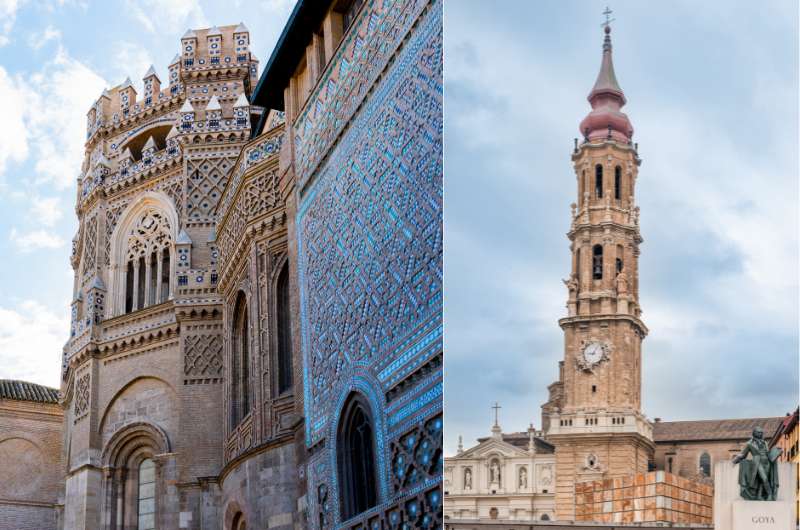
La Seo
La Seo Cathedral (or Catedral del Salvador) was originally a mosque. When King Alfonso I of Aragon gained power over Zaragoza, in the early 12th century, he decided to renovate and transform it instead of destroying it.
The cathedral was expanded various times and stands out thanks to its distinctive mix of architectural styles. The Aragonese Mudéjar style is unique from that in other Spanish regions, namely the thick walls, wooden ceilings and much more ornate exterior. The Gothic alabaster altar is considered a masterpiece.
Tip: If you end up wanting to stay the night, Silken Reino de Aragón is a hotel in the Old Town close to all the highlights.
It was also used for the coronation of the kings of Aragon and served as a place for performing important functions such as royal weddings and burials.
Inside, you will also find a museum with a tapestry collection known as the Museo de Tapices de la Seo. It’s supposed to be a world-class collection. I mean they’re wall rugs. Take it or leave it.
- La Seo Cathedral, Plaza del la Seo
- Monday to Saturday 10 am–2:30 pm, 4 pm–8 pm. Sundays 10 am–12 pm, 4 pm–6:30 pm.
- Tickets are €7.
5. The Stone Bridge
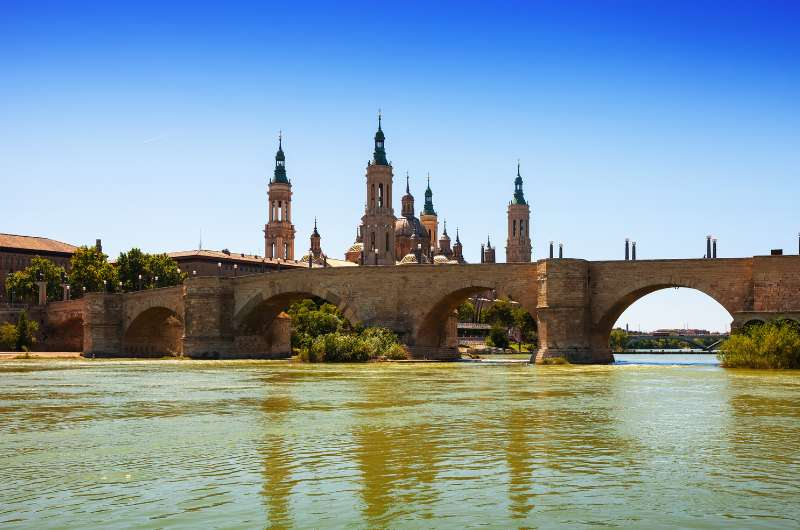
Puente de Piedra
The Stone Bridge (Puente de Piedra) is also called the Bridge of Lions, thanks to the two bronze statues on the columns on each end of it.
It’s a low, massive bridge stone bridge that looks like nothing can destroy it. But in fact, a flood in 1643 swept away the middle section. Two towers were destroyed by the water and the bridge collapsed in between.
You can look up a painting by Juan Bautista Martínez del Mazo called View of Zaragoza to see what the bridge looked like after the flood. He painted the bridge in 1647 and it gives an interesting peak into history.
Nowadays it is a regular bridge with car traffic and walkways on either side. Its main attraction is the location right next to the Basilica de Pilar. You can get awesome views of it from the bridge. If you are staying overnight, head over at sunset. You might even feel Zaragoza is worth going to because of the view!
Or walk the 225 m (700 feet) to the other end. There is a small observation area on the right side called Balcón De San Lázaro there. That way, you can get the basilica and the bridge in the photo.
6. Origami Museum (EMOZ)
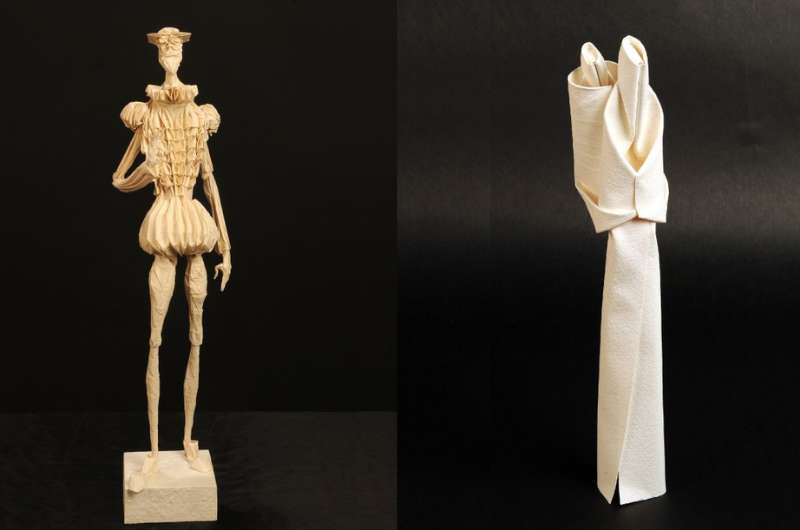
My paper airplanes don’t compare!
Now bear with me. I’m guessing you aren’t an origami fan, and this isn’t Japan, so maybe you want to skip this museum and not even think about it. But truthfully, this place was awesome! Forget Goya Museum and come here instead.
A paperfolding group has existed in Zaragoza since 1944, so the museum isn’t a totally random occurrence. Thanks to the members’ relationship with international folders, they are able to get some impressive pieces for the exhibitions.
I remember as a kid, getting a paper airplane to really fly required making some extra folds that my little fingers were very proud of. But this museum’s origami collection took my idea of folding paper to a whole new level. Impressive, really.
These aren’t just cooler versions of swans and boats, these are masterpieces. It’s the first museum of its kind in Europe and shows original models of the most important folders in the world. Who knew there even was such a thing.
It’s not a big place, so you won’t waste much time—but who am I kidding, this is Zaragoza, you already have too much time on your hands. The museum is on the top floor of a historical building that houses the Historical Center, so that can count as a bonus.
- EMOZ, Centro Historico, Plaza San Agustín 2
- Closed Mondays. Tuesday to Saturday 10 am–2 pm, 5 pm–9 pm. Sundays 10 am–2 pm.
- Tickets cost €3.
7. Goya Museum
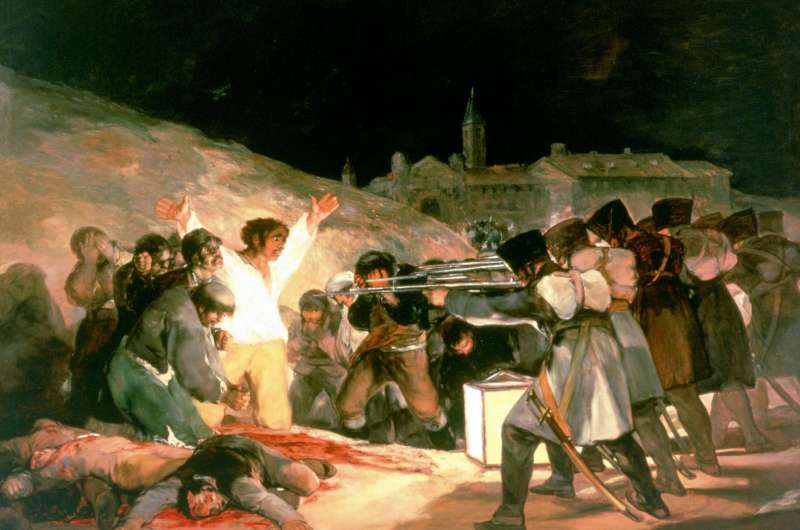
One of Goya’s lovely paintings
Francisco José de Goya y Lucientes is one of the most famous Spanish artists. You will know him for his angel-filled church frescos and perhaps even for his bullfighting-themed paintings.
His glamorized take on bullfights even gave way to the annual bullfighting festivities in Ronda, the Feria Goyesca de Pedro Romero.
The museum is ok, I learned some interesting facts about Goya, like that he painted his best paintings only after he suffered a serious illness that left him deaf (that happened in his late fifties). But if one Google search makes you skeptical of how much you’d enjoy the museum, you might be right. It’s on the list because there isn’t much to do in Zaragoza.
Go in if you like this style of art, but know that there isn’t a ton of Goya’s artwork on display. Most of what is displayed isn’t Goya at all, with exhibitions on art pre- and post-Goya taking up a large part of the several floors.
- Goya Museum, 23 calle Espoz y Mina
- Monday to Saturday 10 am–2 pm, 4 pm–8 pm. Sundays 10 am–2 pm.
- Tickets cost €6.
Alright, you did it! Ready to move on to a more interesting city? Barcelona? Bilbao? Valencia (it better be March!)?
Like I said, I don’t think you need to go to Zaragoza unless you’ve been everywhere else in Spain or you live within 30 km from it. But it won’t kill you, it’s not terrible. There are nice aspects to it. It’s just not a holiday destination.
This post may contain affiliate links. We earn a small commission if you make bookings through my links, at no additional cost to you. Thank you for your support!


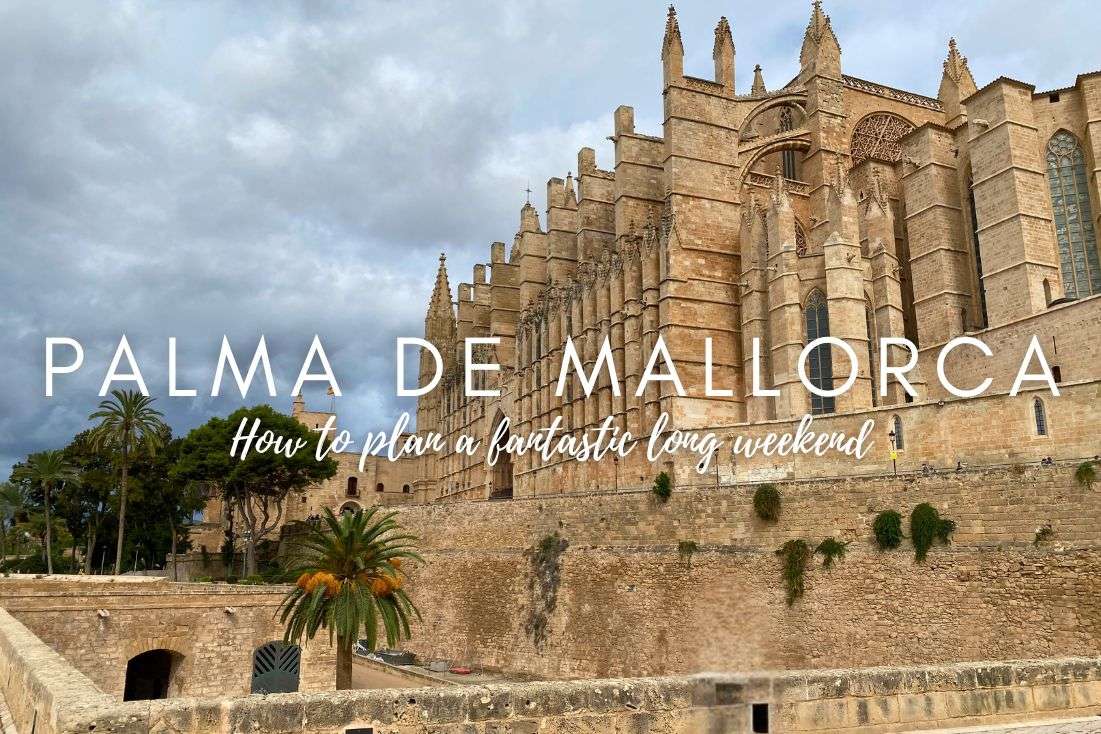
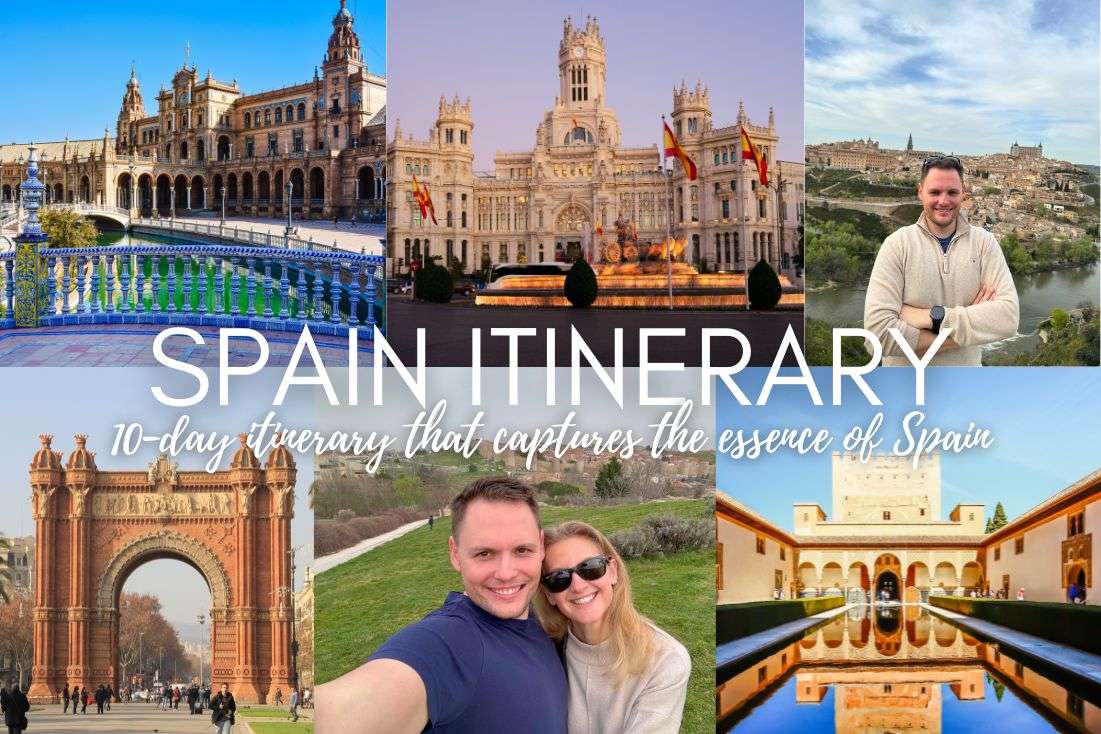
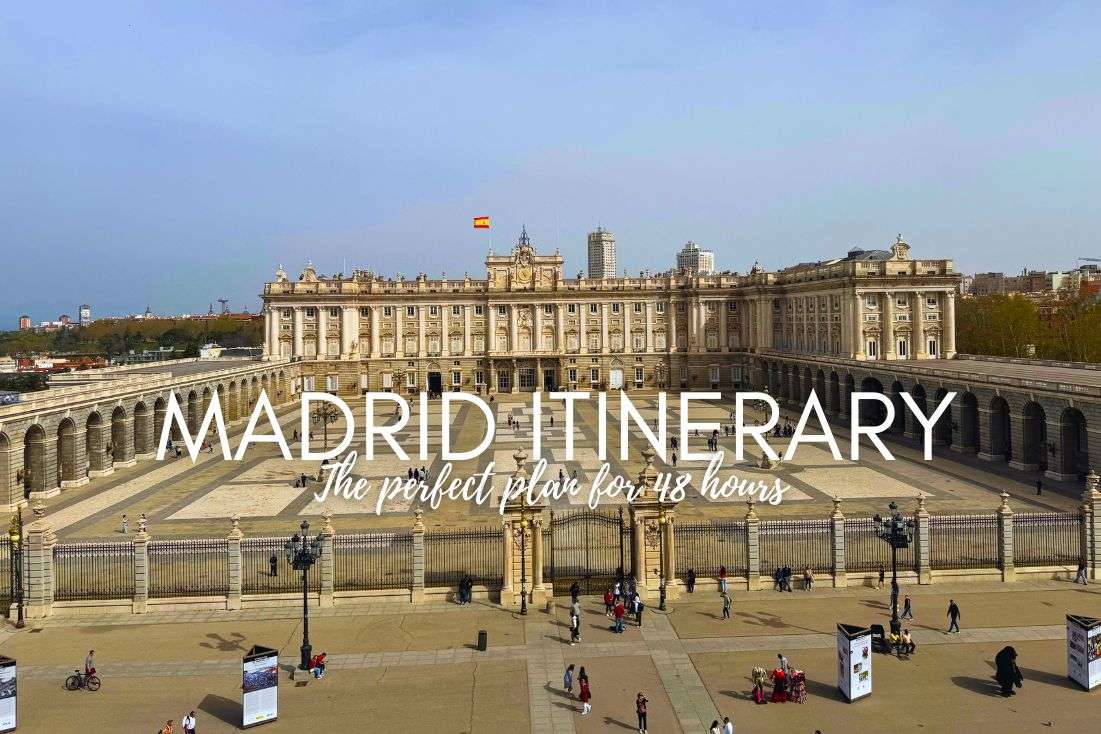





Comments | Thoughts? Give us a shout!